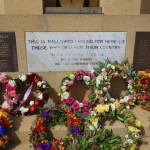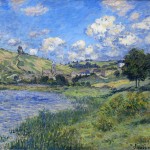FRIENDSHIP
Perhaps you, my blog readers, could help me understand something about this poem that my father wrote: As you get towards the end you’ll see a line about a ‘flare’; what do you think was happening? Read the whole poem and let me know if you can enlighten me.
Sixty-nine refers to Hill 69 near Gaza, Palestine, where my father’s battalion was recovering after having defended Tobruk in Libya; at Hill 69 they did further training as well as garrison and border protection.
The photo shows the first verse in his handwriting but I’ve transcribed all the verses, which you’ll see below the image. I was inspired by the ‘Friendship’ theme of this week’s WordPress Weekly Photo Challenge to add this poem, which, you’ll find, is about friendship in war.
The poem is signed with my father’s initials, R.E.B. I ask that it not be copied without my permission and without credit to him.
Red Kane of 69
“Something’s brewing,” said Red to his mate,
As they gazed along the line,
“It don’t get quiet for nothing,
Not here, at Sixty-nine.”
He thought of a time, two months ago,
He got a similar hunch,
And Jerrie came over in “Spitfires”,
And wiped out most of his bunch.
The “TRICK” was as old as the bloody hills,
The one they pulled that night.
In a couple of patched-up Spitfires,
They made that bloody flight;
All eyes looked in their direction,
The shout went up, “All’s Well”,
In came the bloody Spitfires,
Turning loose All Hell.
“I’ll square that deal, cobbers,” he said,
Damned near fit to howl,
“Even if it cost me me bloody life,”
“By bloody fair means or fowl;”
For he was a Dinkum Aussie,
Big and strong as a lion,
And he was a natural marksman too,
Red Kane, of Sixty-nine.
And now as he gazed across the sand,
Something to him was clear,
There was Jerry movement on tonight,
And to him came a great idea;
And so he spoke in whispers,
As he conversed with his mate,
Tonight they’d square a deal,
Regardless of their fate.
The Jerries moved with caution,
More cautious still, was Kane,
He wondered how his mate was,
If things panned out the same;
Complete in every detail now,
He lay face down, in prayer,
For five in every hundred yards,
He’d set and laid a flare.
That night, his mates were avenged,
Paid back, more than two-fold,
Paid by the help of his very own life,
For he now lay stiff and cold;
He’s gone to the great Beyond now,
A place of Perfect Design,
And greater love hath no man,
Than Red Kane of Sixty-nine.
Ronald E. Bruce, 1941
© Patricia Worth, 2012





Here is a link to it on Wikipedia: http://en.wikipedia.org/wiki/Hill_69#Hill_69
Wikipedia has a lot of information.
Hi, I’m wondering about the action of laying the flares (not about Hill 69). Hope someone can tell me what was described in that verse. Thanks.
I don’t know Trish. It’s strange, almost as if your Dad left out a verse that would have been extraneous to the men of his battalion. He tells us Red was a cracker marksman, and was out to avenge the German deception that had cost them so dear. I’m sure you will be able to find something about it in the battalion history, or at the National War Memorial library, but I’ll bet Red and his mate hatched a plan to lure the Spitfires to a certain place – laying the flares as a bait – from whence Red could fire up at them. He’s found, lying face down, cold, which would indicate he was some distance from the rest of the men when he lay on his belly and aimed at the incoming planes, whose gunners aimed back … A tale of revenge, or altruism? Made me cry. Sooo typical, in that laconic style, of the mateship we both equate with true friendship.
I also wondered whether he forgot to write a verse in when he made the ‘good’ copy in his anthology. But then I tried to imagine the scene exactly as you had, and it pretty well made sense. I think Red laid the flares to attract the Germans, knowing it would cost him his life. My young adult son said the verses didn’t make sense, but then he didn’t know what Spitfires were…
It would be an interesting project to go the the Australian War Memorial, as you suggested, and try to find out who Red Kane was.
Do you have your father’s battalion book? You could probably find it in there without going to the library. They might also have a record of engagements – cause, if Red was killed, it would have been termed an engagement, surely?
Or was it what they dreamed of doing, I wonder?
I’ve just re-read it – I don’t think here’s a verse missing, Trish, I think the boys would have known exactly what type of manoeuvre Red and his mate were hatching.
That’s interesting about your son. How we take for granted some things will live on as general knowledge forever, when only a generation or two they become history. Or did he miss the switcheroo the Germans pulled by raiding them with British planes?
Were the Spitfires pinched from the British? You’ve just explained something for me. Thanks. Now I understand why they looked up and said “All’s well”.
There are a couple of books written about the 2/15th battalion. I own one. However, the War Memorial is ten minutes away from me so I should go and ask them. I’ve done a lot of research there and found them very helpful. Thanks very much for your suggestions, and especially your interest!
Yes! Captured, I guess.
I enjoyed it. A, I always love trying to unravel a mystery, and B. Papa’s mate was a Rat and so he would have been among your Dad
s mob.
I dont know if you have found any thing yet but I think it is trip wires, usually barbed or razor, that are laid as protection. If tripped set off by the enemy they would be alerted by flares being ignited. and also set up with mines as well. They were set at night and release in morning etc.Hope this is some idea and useful. anyway Trish brill post and very powerful poem. 😉
Huh, that’s a coincidence that we both wrote a friendship post about men who’ve been to Tobruk. Your Papa is undoubtedly in one of my many photos.
Thanks Gerry for these ideas – I’ll take them with me when I ask about the incident at the War Memorial. Thanks for reading my poem and for your compliments.
It was ‘Uncle’ Bill, not Papa, who was the Rat, but yes, I’m sure he’ll be there. 6’6″, pretty well bald, ugly as sin and one of the most beautiful men I’ve ever met. 🙂
Let us know any results you may find, it would interesting to know.
Ok, I will.